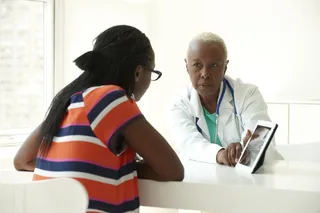The 411 on Crohn’s Disease
Understanding this digestive health illness.

1 / 10
Understanding This Digestive Disease - While we don’t often talk about Crohn’s Disease (CD), it’s an illness that affects more than one million people each year. Read more about this chronic illness and how it impacts African-Americans. —Kellee Terrell(Photo: Rick Gomez/Corbis)

2 / 10
What Is Crohn’s? - CD is an inflammatory bowel disease that causes inflammation of the lining of your digestive tract. Inflammation happens because your body tricks itself into thinking that it’s being attacked, and unnecessarily unleashes white blood cells on your healthy bowels and colon. (Photo: JACOPIN / BSIP/BSIP/Corbis)

3 / 10
What Are the Symptoms? - Symptoms of CD include diarrhea, pain and cramping, ulcers (open sores), blood in your stool, weight loss and loss of appetite. Other symptoms include fever, arthritis, eye inflammation, mouth sores and fatigue. (Photo: Image Source/Getty Images)

4 / 10
How Common Is It? - It’s estimated that there are one million Americans who suffer from this chronic illness. The disease can affect anyone at any age, but it’s mostly diagnosed in young people ages 15-35. About 10 percent of those with CD are under the age of 18, says the New York Times. (Photo: LWA/Dann Tardif/Getty Images)
Photo By Getty Images/STOCK

5 / 10
Blacks and Crohn’s Disease - While CD is more common among whites, our numbers have been going up in the past years. Past studies have shown that when we have CD our disease and symptoms are much more severe than whites. Also, Blacks are grossly underrepresented in clinical trials. (Photo: American Cancer Society/Getty Images)
ADVERTISEMENT

6 / 10
What Causes CD? - Doctors aren’t really sure what causes CD, but they believe that stress, diet and certain bacteria may trigger CD symptoms. Also, having a family history of the disease raises your risk of having CD too. (Photo: Willie B. Thomas/Getty Images)

7 / 10
Complications of CD - CD can make it difficult to use the bathroom, cause serious ulcers, colon cancer, anal cracks, malnutrition and internal fistulas (abnormal connections between your intestines and other organs such the bladder and vagina). African-Americans are more likely to have fistulas. (Photo: David Silverman/Getty Images)

8 / 10
Getting Tested for CD - The signs for CD can look like other issues like colon cancer and colitis, so the doctor will rule out everything by having you take a blood test, colonoscopy, fecal test and a MRI to name a few. (Photo: ZEPHYR/Getty Images)

9 / 10
Treating CD - There is no cure for CD, but there is treatment to alleviate symptoms. Doctors may prescribe anti-inflammatory drugs, drugs to help reduce nausea and diarrhea, immune system drugs, pain relievers, iron pills and a healthier diet. If none of that works, surgery might be an option. Photo: Ingram Publishing / Getty Images)
